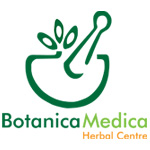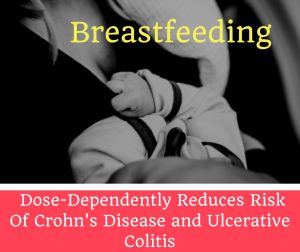Breastfeeding Dose-Dependently Reduces Risk of Crohn’s Disease and Ulcerative Colitis
TAKE-HOME MESSAGE
* A meta-analysis was conducted to assess the association between breastfeeding in infancy and a later risk for Crohn’s disease or ulcerative colitis. The risk of an IBD (Inflammatory bowel disease) diagnosis was inversely associated with ever having been breastfed. Additionally, this was a dose-dependent association, with breastfeeding for at least 12 months associated with the strongest reduction in risk.
* The association between disease risk and breastfeeding held across all ethnic groups; however, the magnitude of protection was especially large in Asian compared with Caucasian cohorts.
Breastfeeding Protects Against Inflammatory Bowel Disease
A baby is born with a sterile GI (gastrointestinal) track, which quickly gets populated with bacteria that are difficult to change once established. Breastfeeding increases firmicutes ((Latin: firmus, strong, and cutis, skin, referring to the cell wall) are a phylum of bacteria, most of which have Gram-positive cell wall structure)) and actinobacteria; formula-fed infants have more Clostridium difficile(C. Diff). The authors share research showing that C. diff increases the risk of autoimmunity and allergic sensitivity. And this is just the influence on the microbiome (protects us against germs, breaks down food to release energy, and produces vitamins). Breastfeeding may have other effects that help reduce the risk of systemic inflammation as the child grows.
This meta-analysis of 35 studies shows that there is a dose–response protective effect of the duration of breastfeeding on inflammatory bowel disease. The association shows as much as an 80% reduction in risk for both Crohn’s disease and ulcerative colitis for breastfeeding more than 12 months.
Inflammatory bowel disease arises from a complex set of interactions related to genetic susceptibility, environmental exposures, and a dysregulated immune response to dysbiotic intestinal microbiota, according to the study authors. These data will give us one more reason to encourage breastfeeding, ideally for a year or more.
BACKGROUND
Breastfeeding is a modifiable factor that may influence development of inflammatory bowel diseases. However, literature on this has been inconsistent and not accounted for heterogeneity in populations and exposure.
AIM
To conduct a meta-analysis to examine the association between breastfeeding in infancy and risk of Crohn’s disease and ulcerative colitis.
METHODS
A systematic search of Medline/PubMed and Embase was performed for full text, English-language literature through November 2016. Studies were included if they described breastfeeding in infancy in patients with Crohn’s disease or ulcerative colitis, and healthy controls. Data were pooled using a random effects model for analysis.
RESULTS
A total of 35 studies were included in the final analysis, comprising 7536 individuals with Crohn’s disease , 7353 with ulcerative colitis and 330 222 controls. Ever being breastfed was associated with a lower risk of Crohn’s disease (OR 0.71, 95% CI 0.59-0.85) and ulcerative colitis (OR 0.78, 95% CI 0.67-0.91). While this inverse association was observed in all ethnicity groups, the magnitude of protection was significantly greater among Asians (OR 0.31, 95% CI 0.20-0.48) compared to Caucasians (OR 0.78, 95% CI 0.66-0.93; P = .0001) in Crohn’s disease. Breastfeeding duration showed a dose-dependent association, with strongest decrease in risk when breastfed for at least 12 months for Crohn’s disease (OR 0.20, 95% CI 0.08-0.50) and ulcerative colitis (OR 0.21, 95% CI 0.10-0.43) as compared to 3 or 6 months.
CONCLUSION
Breastfeeding in infancy protects against the development of Crohn’s disease and ulcerative colitis.
At Botanica Medica our Naturopaths are well aware of the importance of exercise, a good diet and the effect it can have on your life both physically and mentally. They come across lots of interesting studies and are always updating their knowledge. If you would like to make an appointment with one of our Naturopaths call Botanica Medica on 8271-1827 today. They are only to happy to share the knowledge they have gained through their studies and patient outcomes, and get you feeling better. Botanica Medica is located at 97 Glen Osmond Road, Eastwood and appointments are available Monday to Saturday including some after hours.
FEATURED
Published in Primary Care and
1 other channel
Journal Scan / Research · October 18, 2017
Breastfeeding Dose-Dependently Reduces Risk of Crohn’s Disease and Ulcerative Colitis
Alimentary Pharmacology & Therapeutics
Primary Care
Written byDavid Rakel MD, FAAFP


Recent Comments